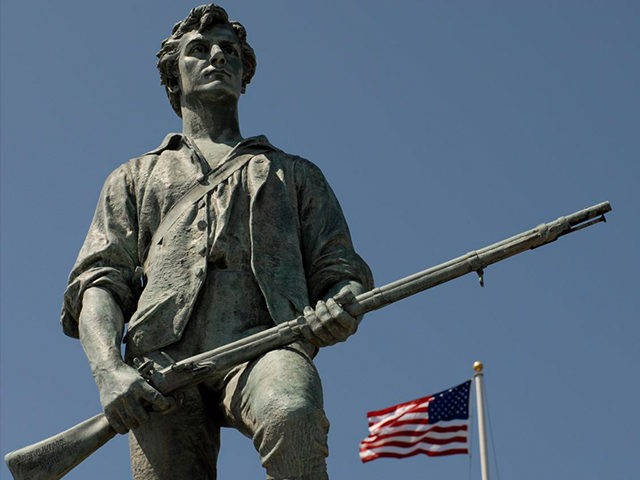During Breitbart News Daily’s Fourth of July Special, Breitbart’s Dr. AWR Hawkins discussed the indispensability of armed militia members, coupled with the irregular tactics of theirs militias, in regards to victory in the American Revolution.
He also described the way the militia complimented George Washington’s Continental Army and the important lessons the militia has to offer on gun ownership.
Host Stephen K. Bannon directed the conversation toward how the American Revolution was fought “and the concept of militias.” He pointed out that militias were popular in the minds of some 18th century military leaders, not popular in the minds of others. Yet it is inarguable that the militias won the war as it “turned down to the South.”
He then asked Hawkins to explain the difference between “what the militia was and what the Continental Army was.”
Hawkins responded:
Regarding the difference between the Continental Army and the militia we just need to remember that the militia is a very local organization from its start; it goes through various cycles from the 1600s to the time of the revolutionary war–the American Revolution. It was local throughout its history while the Continental Army was, as it sounds, national.
The Continental Army was under George Washington and was more organized–I should say, more militarized, by which I mean better disciplined in the type of military tactics they used.
In the militia you’re going to have a lot of hit and run tactics, a lot of what we refer to as guerrilla warfare. So the militia gave the British fits. Instead of lining up against them as a regular army–like the Continental Army would–you have the militia coming in behind, coming in beside, taking a hit then running. Ambushes and different things. Shooting at officers instead of shooting at rank and file. In short, doing what they had to do to win.
Bannon referenced asymmetric warfare–the type of warfare evidenced by militia methodology–emphasizing too how that type of warfare presented the British with something other than what they expected.
Hawkins observed:
It is important to note as well that Washington used this type of warfare when advantageous. Whether he learned it from the militias I cannot say. But in the North, when the battles in New York were taking place, he would use that type of warfare too: a quick hit, then back up, while they’re not ready, another quick hit, back up. Not with his full army, but only with this detachment or that one.
So he was successful with that tactic too, but that was an exception to his rule. For the militia, that was the overarching rule.
And the militia was hard to spot. The way they dressed meant a member of the militia looked just the farmer who wasn’t a member of the militia. A member of the militia looked just like the Loyalist who wasn’t a member of the militia. A member of the militia was not someone that the British could spot when they rolled into a town, so they never knew who’d they had angered and who they hadn’t. They never knew who was fighting for independence and who wasn’t. And this gave the militia the upper hand.
Bannon then pointed to the “grit” and fortitude of the citizen soldiers; of the members of the militias who fought the British in the South. Hawkins responded by pointing to David Hackett Fischer’s book Albion’s Seed–particularly Fischer’s overview of the types of people that settled the southern colonies, their origins on the edges of society in Europe.
Hawkins stressed that these were people who came from parts of Europe where they had to defend themselves and their families–they had to administer justice or justice would not be administered. As the British moved through the South they trampled the crops of these people, burned the homes of these people, and drew the indignation of these people as well.
Bannon then asked Hawkins if there is a direct connection between the where we are today–regarding the focus on the importance on gun rights–and where the colonists were in 1776, 1777, 1778, etc.
Hawkins said:
There such is a connection. If those militia members had not had weapons, if an individual militia member had not had his weapon to come together with other militia members, then what good would they have been?
George Washington put his finger on this after his success at the end of 1776, and he basically became successful only at the very end of 1776. Even after that he pointed out that the British ultimately didn’t have to defeat colonists. Rather, they had to defeat the colonists’ arms. And that’s what stood in the way of the British in the late 1700s and that’s what stands in the way of tyrants here, in the 21st century. That connection is unbreakable.
It is easy to see. It’s a consistent thread to through American history. And our Founders hedged in gun rights for that reason.
As long as the tyrants have to overcome not simply the people, but the people’s arms, then freedom is safe.

COMMENTS
Please let us know if you're having issues with commenting.